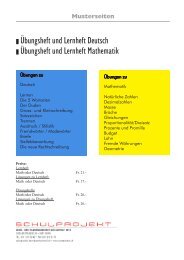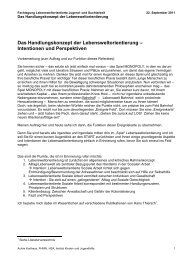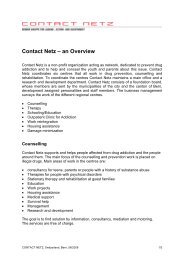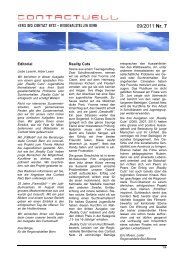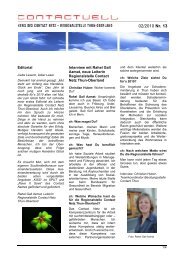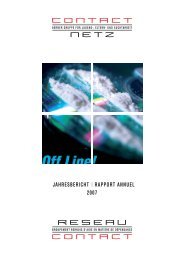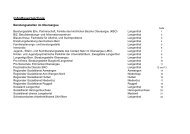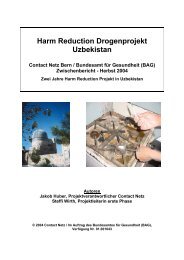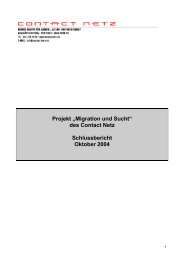Harm Reduction Drug Project Uzbekistan - Contact Netz
Harm Reduction Drug Project Uzbekistan - Contact Netz
Harm Reduction Drug Project Uzbekistan - Contact Netz
You also want an ePaper? Increase the reach of your titles
YUMPU automatically turns print PDFs into web optimized ePapers that Google loves.
6. <strong>Project</strong> implementation<br />
6.1 Phase One - October 2002 – July 2003<br />
Phase One consisted mainly of familiarisation with the political situation,<br />
networking at professional and political levels, and selecting suitable local partner<br />
organisations.<br />
It very soon became clear that the ideas put forward by the representative of the<br />
Uzbek Ministry of Health were very different from the objectives that had been<br />
formally set out in the project agreement. Above all, the MoH representative<br />
expected all the doctors working in the project to be managed directly by and<br />
report to the Ministry. This difference of opinion resulted in long and often difficult<br />
discussions not only about content (“What is harm reduction?”) but also about<br />
structure and strategy. During this phase it was important to build a relationship of<br />
trust, but also to agree jointly on the role of the Ministry of Health. Whereas on the<br />
Swiss side priority was given to the political dimension (gaining acceptance of the<br />
idea of harm reduction and the four-pillar model) and to coordinating the various<br />
players, the Uzbek MoH focused its attention very strongly on the control aspects.<br />
Discussions constantly returned to these points and led to repeated debates and<br />
clarifications of position.<br />
6.1.1 Successful search for partner organisations<br />
At the same time, the <strong>Project</strong> Leader began to look for suitable partner<br />
organisations. The prerequisite was an organisation’s readiness to carry out<br />
development work in collaboration with Swiss project leadership, so that the<br />
project could be adapted to local circumstances and customs.<br />
From the point of view of the <strong>Contact</strong> Net, it was clear from the beginning that only<br />
a process-oriented approach could ensure successful implementation. The Swiss<br />
experience in this area would provide guidelines and inputs. But the question --<br />
“What should a harm reduction project for <strong>Uzbekistan</strong> look like?“ -- could only be<br />
answered through a joint development effort and would involve a considerable<br />
learning process for all concerned.<br />
This manner of proceeding caused considerable uncertainty for many NGOs. They<br />
are used to being presented with clear requirements by donors, not only at the<br />
strategic level but also at the operational level. Moreover the whole harm reduction<br />
approach met with resistance from some organisations. They stressed the primary<br />
importance of prevention and had doubts about the feasibility of a harm reduction<br />
project, partly because of the current political situation and partly due to what they<br />
perceive as the Uzbek mentality.<br />
The definitive choice of partner organisations therefore took place only after a twoday<br />
seminar in which the project objectives and Switzerland’s experience were<br />
presented and a first view of how implementation could proceed in their own<br />
environment was prepared with the help of the participants. This created a basis<br />
for decision-making on both sides which has certainly proven its worth.<br />
Subsequently two NGOs, SABO in Tashkent and Ayol in Samarkand, were chosen<br />
as partner organisations. The work began in March 2003 under the leadership of<br />
<strong>Contact</strong> Net.<br />
In this first phase, various international organisations already in <strong>Uzbekistan</strong><br />
(UNODC, WHO, UNDP, USAID, etc.) which were working mainly to prevent or<br />
combat illegal trafficking in drugs, were contacted so as to make the best of any<br />
possible synergies.<br />
16<br />
Networking<br />
Role of the<br />
Ministry of<br />
Health<br />
Process<br />
orientation,<br />
approach based<br />
on participation<br />
Need for<br />
partnership<br />
NGO<br />
uncertainty<br />
NGOs in<br />
Tashkent und<br />
Samarkand





